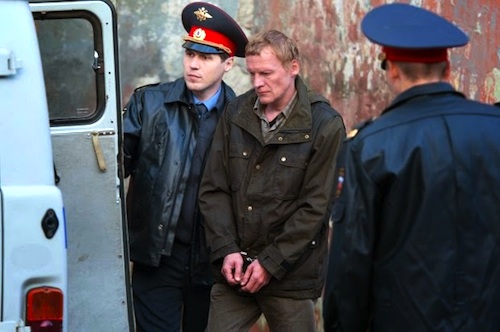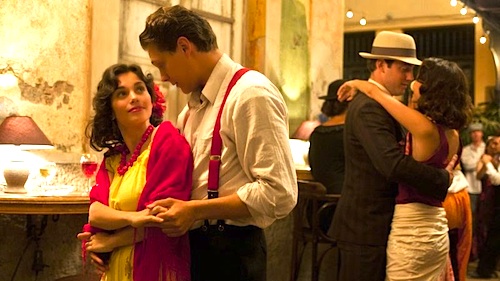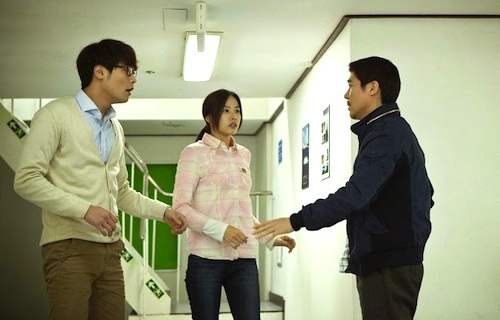By Joe Bendel. It is worth noting that Andrey Zvyagintsev originally hails from Siberia, the traditional banishing ground of Russian dissidents. Perhaps then it is not surprising that dissent is in his DNA. Up to now, his films have shown an affinity for the marginalized and the compromised in Russian society. However, his latest, Cannes award winning film boldly critiques the two greatest power centers in modern Russia, Putin’s government and the Orthodox Church. Rather shockingly, Russia selected Zvyagintsev’s Leviathan as their official foreign language Oscar submission (one can imagine several film authority bureaucrats were transferred to Siberian radio for that one), but it stands a fair chance of being nominated, having just made the shortlist cut. Already a recognizable contemporary classic, Leviathan opens Christmas Day at Film Forum.
Kolya is not a sophisticated man, but he knows injustice for what it is. He lives next to his hardscrabble automotive garage with his somewhat younger second wife Lilya and Roma, his son from his first marriage. His house and surrounding land are all he owns, but the town’s corpulently corrupt Mayor Vadim Shelevyat covets it for his dodgy development scheme. Naturally, he is not inclined to pay Kolya a fair price, preferring instead to use the Russian equivalent of imminent domain.
Shelevyat expects that will be that, as it usually is when the machinery of the state is unleashed, but Kolya is made of unusually stern stuff. His old army buddy Dmitri also happens to be a hotshot attorney from Moscow, who owes Kolya a favor. Dmitri fully understands the law in such cases, but Shelevyat and his underlings refuse to acknowledge it. The advocate also has a dossier of embarrassing dirt on the Mayor, but getting into a hardball contest with Shelevyat is a dangerous proposition. As the provincial dictator turns up the heat, with the implied support of the local Orthodox bishop, tensions within Kolya’s family and Dmitri’s mixed motives threaten to fatally undermine the embattled mechanic.
There is no mistaking Leviathan’s political implications, especially when Putin’s ominous portrait stares down from Shelevyat’s wall as plans each successive abuse of power. However, the extent to which he calls out the Orthodox Church for abetting the current regime is jaw-droppingly gutsy (should you doubt it, simply review the fate of the Pussy Riot band-members after protesting the Church’s support for Putin). Yet, it would be wrong to mislabel Zvyagintsev as anti-Church, because there is at least one pious Orthodox clergyman in Leviathan, who appears uncomfortable with his leadership.
Zvyagintsev briefly unleashes Russia’s anarchic sensibilities when Kolya’s off-duty highway patrol officer buddies take him target-shooting using the portraits of the old Soviet masters. Not so coincidentally, they might be the healthiest characters in the film, but despite their unruliness, they are largely disenfranchised cogs in a state apparatus dominated by the likes of Shelevyat.

Clearly, Leviathan offers a withering assessment of the current state of Russian affairs, but Zvyagintsev’s critiques are fully integrated into the wider narrative whole. In fact, the former serve the latter, rather than vice versa. As a result, Leviathan has the form of a parable, the soul of a Russian tragedy, and the moral outrage of a J’accuse. Critically, it is also remarkably forceful when judged on purely cinematic terms. As Kolya, Aleksey Serebryakov is no mere symbolic everyman. His pain and rage hit the audience on a level that is honest and true. Likewise, Vladimir Vdovichenkov plays Dmitri and all his human failings with mature subtlety. Yet perhaps appropriately, Roman Madianov largely defines and personifies Leviathan as the buffoonish but ruthless Shelevyat.
Without question, Leviathan is an important cinematic statement that will reverberate beyond the short term awards season. It is like hydrogen peroxide in film form. It stings and it disinfects. Stylistically, it is somewhat uncompromising, but it still demands a wide audience. Highly recommended, it opens Thursday the 25th (ho, ho, ho, Merry Christmas) at Film Forum in New York. Patrons in other cities should waste no time seeing it when it opens, in case the national exhibitors start pulling it for fear it will offend an oppressive foreign regime, since that’s what they apparently do these days, especially when they are released by a division of Sony.
LFM GRADE: A
Posted on December 23rd, 2014 at 11:46am.

